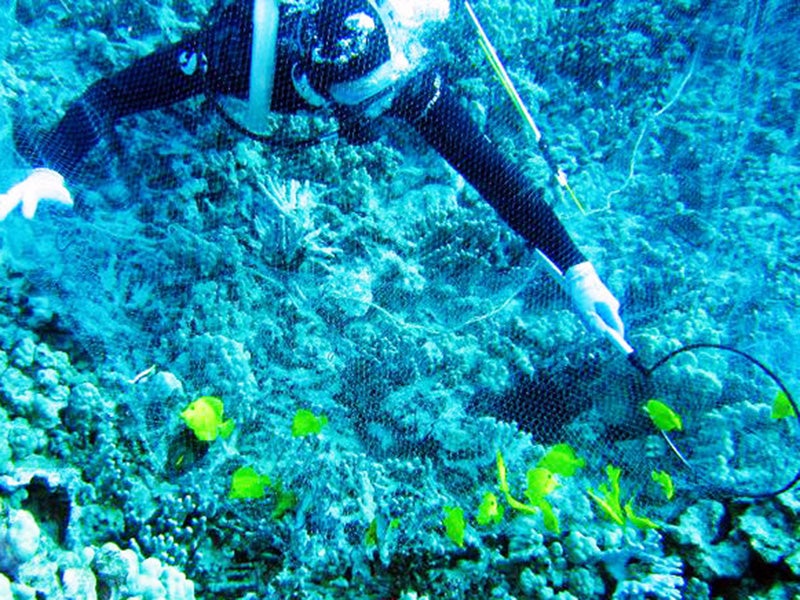Hawaiʻi Supreme Court Fails to Protect Coastal Reef Fish
Court opens door to fish collection permits for West Hawai‘i, subject to Land Board approval
Contact
The Hawai‘i Supreme Court ruled in a 4-1 decision that the pet industry’s environmental review of commercial aquarium fish collection in West Hawai‘i is legally adequate today. The ruling means the state Board of Land and Natural Resources may proceed with considering permits to reopen nearly the entire West Hawai‘i coastline to commercial aquarium collection, which has historically stripped hundreds of thousands of native fish from Hawai‘i’s reefs each year.
The Court’s ruling in Kaupiko v. BLNR effectively ends a de facto ban on commercial collection that has been in place since an earlier Supreme Court decision in 2017 mandated public disclosure and analysis of the aquarium pet trade’s effects.
Willie Kaupiko, Ka‘imi Kaupiko, Mike Nakachi, For the Fishes, the Center for Biological Diversity, and Kai Palaoa, represented by Earthjustice, filed suit in 2021 to enforce Hawai‘i’s environmental review laws after a Board tie vote resulted in default approval of the aquarium pet trade’s second impact statement for West Hawai‘i. The Board had previously rejected the trade’s first attempt at an impact statement by a unanimous vote in 2020. The Supreme Court’s ruling today upholds the trade’s second impact statement.
“We are very concerned that today’s ruling will open the floodgates to destructive levels of commercial aquarium harvesting in Hawai‘i’s waters,” said Rene Umberger, Executive Director of For the Fishes. “Removing fish from our reefs, which face a host of other dangers from pollution to climate change, threatens the delicate ecology that depends on these aquatic species. It’s disappointing that the court is upholding an insufficient environmental impact statement that fails to disclose and mitigate against known environmental consequences of this industry.”
For decades, commercial aquarium fish collectors targeted West Hawai‘i’s vibrant waters for small reef fish, packaging the live fish in plastic bags for export to aquarium fish wholesalers and retailers across the continental United States. The court’s approval of the industry’s second impact statement effectively allows the Board to resume issuing permits for commercial collection in West Hawai‘i.
“The court’s decision paves the way for the Board to make management decisions based on incomplete and faulty information, which undermines the purpose of Hawai‘i’s environmental review laws and the Board’s public trust obligations,” said Earthjustice attorney Mahesh Cleveland. “We are disappointed by the decision but stand ready to make our case to the Board that the industry’s plans for reopening collection in West Hawai‘i are deeply flawed, and that permits must be denied.”
In the dissenting opinion, Justice Sabrina McKenna concluded that the pet industry’s impact statement “failed to include sufficient information” required by law, expressing her “hope that [the agency] will carefully monitor fish populations to determine whether annual permits should be renewed or whether catch quotas need to be modified.”
“We believe in the power of the government to work together with our communities to find long-term and pono solutions for our fishery management issues,” said Ka‘imi Kaupiko of Miloli‘i, who also advocated successfully alongside his neighbors and family to establish a community-based subsistence fishery area fronting their village in 2022. “But with the court’s decision approving this impact statement, how can we ever be sure that these processes work for the people of Hawai‘i and our future generations?”
In addition to challenging the industry’s impact statement in court, several of the Kaupiko plaintiffs joined with others across Hawai‘i last year to request that the Board ban commercial aquarium collection statewide through regulations. The Board unanimously approved the request last December but has not yet begun its formal public rule-making process.
Meanwhile, the Department of Land and Natural Resources has continued to push forward with commercial collection permitting. Last Friday, the Board was poised to approve terms and conditions for eventual permits, but the Board’s decision was contested by West Hawai‘i community members, effectively halting any Board decision on permits until the contested proceeding is resolved. The public provided overwhelming testimony against the permitting proposal, and the Board will ultimately decide, after further public input, whether to grant or deny the community’s contested case request and any permits.
“Ending this collection ban leaves Hawai‘i’s delicate reef fish completely exposed to the dangerous whims of a pet industry that couldn’t care less about their wellbeing,” said Maxx Phillips, Hawai‘i director and attorney at the Center for Biological Diversity. “This decision jeopardizes the fragile balance of our reef ecosystems. We’ll keep fighting these permits and working to make sure that Hawai‘i’s marine wildlife is protected for future generations.”

Additional Resources
About Earthjustice
Earthjustice is the premier nonprofit environmental law organization. We wield the power of law and the strength of partnership to protect people's health, to preserve magnificent places and wildlife, to advance clean energy, and to combat climate change. We are here because the earth needs a good lawyer.